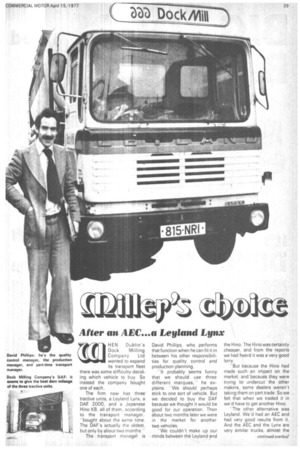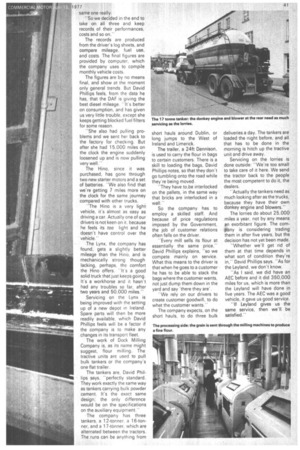After an AEC...a Leyland Lynx
Page 41

Page 43

If you've noticed an error in this article please click here to report it so we can fix it.
HEN Dublin's Dock Milling Company Ltd wanted to expand its transport fleet there was some difficulty deciding which vehicle to buy. So instead the company bought one of each.
The firm now has three tractive units, a Leyland Lynx, a DAP 2000, and a Japanese Nino KB, all of them, according to the transport manager, "bought about the same time. The DAF's actually the oldest, but only by about two months."
The transport marage'r is David Phillips, who performs that function when he can fit it in between his other responsibilities for quality control and production planning.
"It probably seems funny that we should use three different marques," he explains. "We should perhaps stick to one sort of vehicle. But we decided to buy the OAF because we thought it would be good for our operation. Then about two months later we were in the market for another two vehicles.
"We couldn't make up our minds between the Leyland and the Hino. The Hino was certainly cheaper, and from the reports we had heard it was a very good lorry.
"But because the Hino had made such an impact on the market, and because they were trying toundercut the other n-lakers, some dealers weren't taking them on part trade, So we felt that when we traded it in we'd have to get another Hino.
''The other alternative was Leyland. We'd had an AEC and had very good results from it. And the AEC and the Lynx are very similar trucks, almost the same one really: "So we decided in the end to take on all three and keep records of their performances, costs and so on."
The records are produced from the driver's log sheets, and compare mileage, fuel use, and costs. The final figures are provided by computer, which the company uses to compile monthly vehicle costs.
The figures are by no means final, and show at the moment only general trends. But David Phillips feels, from the data he has, that the DAF is giving the best diesel mileage. "It's better on consumption, and has given us very little trouble, except she keeps getting blocked fuel filters for some reason.
"She also had pulling problems and we sent her back to the factory for checicrig. But after she had 15,000 miles on the clock the engine suddenly loosened up and is now pulling very well."
The Hino, since it was purchased, has gone through two new starter motors and a set of batteries. -We also find that we're getting 7 miles more on the clock for the same journey compared with other trucks.
"The Nino is a very light, vehicle, it's almost as easy as driving a car. Actually one of our drivers is not keen on it, because he feels its too light and he doesn't have control over the vehicle.
The Lynx, the company has found, gets a slightly better mileage than the Hino, and is mechanically strong though lacking, perhaps, the comfort the Hino offers. -It's a good solid truck that just keeps going. It's a workhorse and it hasn't had any troubles so far, after two years and 50,000 miles."
Servicing on the Lynx is being improved with the setting up of a new depot in Ireland. Spare parts will then be more readily available, which David Phillips feels will be a factor if the company is to make any changes in its transport fleet.
The work of Dock Milling Company is, as its name might suggest, flour milling. The tractive units are used to pull bulk tankers or the company's one flat trailer.
The tankers are, David Phillips says, "perfectly standard. They work exactly the same way as tankers carrying hulk powder cement. It's the exact same design; the only difference would be on the specifications on the auxiliary equipment."
The company has three tankers, a 1 2-tonner. a 1 6-tonner, and a 1 7-tOnner, which are alternated between the tractors, The runs can be anything from short hauls around Dublin, or long :jumps to the West of Ireland and Limerick.
The trailer, a 24f1 Dennison, is used to carry the flour in bags to certain customers. There is a skill to loading the bags, David Phillips notes, so that they don't go tumbling onto the road while they're being moved.
"They have to.be interlocked on the pallets, in the same way that bricks are interlocked in a wall."
So the company has to employ a skilled staff. And because of price regulations imposed by the Government, the job of customer relations often falls on the driver.
"Every mill sells its flour at essentially the same price," David Phillips explains, "so we compete mainly on service. What this means to the driver is that when he goes to a customer he has to be able to stack the bags where the customer wants, not just dump them down in the yard and say 'there they are'.
"We rely on our drivers to create customer goodwill, to do what the customer wants."
The company expects, on the short hauls, to do three bulk deliveries a day. The tankers are loaded the night before, and all that has to be done in the morning is hitch up the tractive unit and drive away.
Servicing on the lorries is done outside: "We're too small to take care of it here. We send the tractor back to the people the most competent to do it, the dealers.
"Actually the tankers need as much looking after as the trucks, because they have their own donkey engine and blowers."
The lorries do about 25,000 miles a year, not by any means an exorbitant figure. The company is considering trading them in after five years, but the decision has not yet been made.
"Whether we'll get rid of them at that time depends in what sort of condition they're in," David Phillips says. "As for the Leyland, we don't know.
"As I said, we did have an AEC before and it did 350,000 miles for us, which is more than the Leyland will have done in five years. The AEC was a good vehicle, it gave us good service.
"If Leyland gives us the same. service, then we'll be satisfied.''




























































































